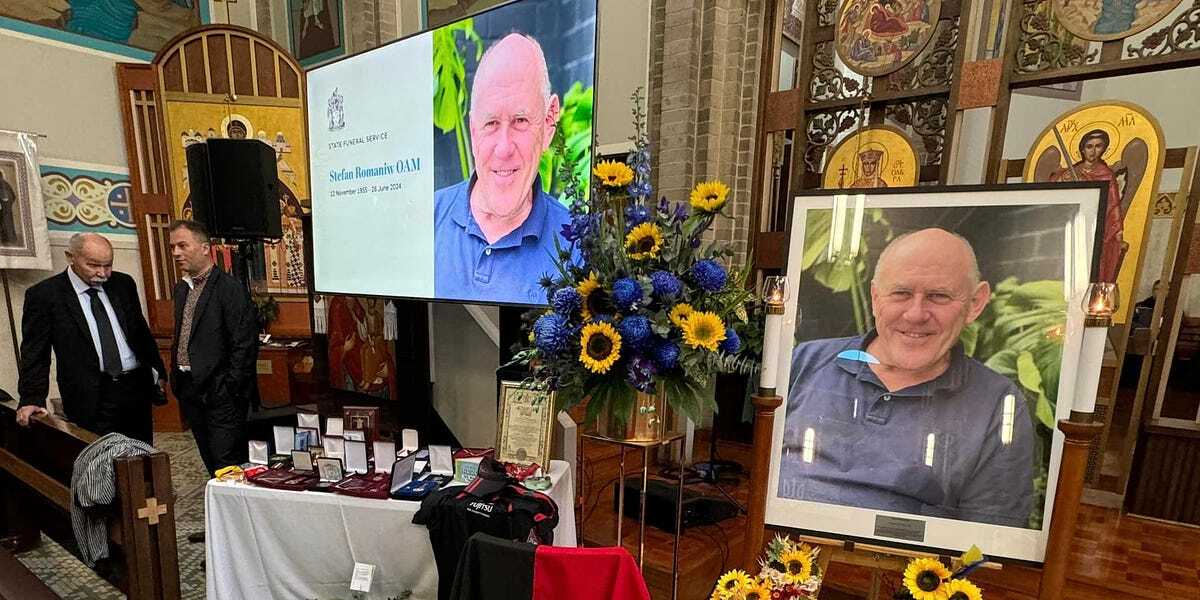On the second Friday of July, flags were flown at half-mast in Romaniw’s home state of Victoria, and its government held a state funeral for him at the Ukrainian Catholic church in North Melbourne. Representing the Prime Minister was Bill Shorten, the Minister for Government Services and former leader of the Labour Party, which also governs in Victoria. “We still seek his wise counsel,” Shorten said at the funeral. “The urge is still there to seek the vague approval from the charismatic leader.”
According to the Australian Federation of Ukrainian Organisations (AFUO), which Romaniw led since the 1990s, “His huge impact — as an untiring community leader, patriot, warrior, mentor and friend — was unmatched. His skill as a collaborator, mediator and unifier strengthened our community immeasurably. Upon his broad shoulders our community grew and prospered, and weathered many storms. He was for so many of us a Ukrainian-Australian hero — a true legend.” The AFUO even declared, “There will never be a person of whom we were so proud.”
Stefan Romaniw acknowledged that the OUN-B operates “through its various façades and partner structures,” meaning its various front groups and other organizations in which the Banderites exercise considerable influence, typically after many years of entryism.
For example, the Stepan Bandera National Revival Center is a “façade structure that is essentially synonymous with the OUN-B leadership in Ukraine and its headquarters building in Kyiv, which is located a short walk from the headquarters of the Security Service of Ukraine, and also close to the “Maidan,” or Independence Square. The AFUO is an important “partner structure” in Australia that functioned as a de facto OUN-B front under Stefan Romaniw’s decades-long stewardship.
“Tactics change, means and methods are updated,” according to Romaniw, but “Ukrainian nationalism as an ideology and political movement is fundamentally based on unchanging values.” For him, this meant honoring the 20th century ideologues of Ukrainian fascism, such as Mykola Mikhnovsky, Dmytro Dontsov, Stepan Bandera, Yaroslav Stetsko, and Stepan Lenkavsky, and adapting modern strategies to advance their catastrophic agenda in the 21st century.
[…]
In 2001, Stefan Romaniw was awarded the Medal of the Order of Australia for “service to education and language learning.” A couple years later, he received the Australian Centenary Medal, and in 2004, the Victorian premier further honored Romaniw with his appointment as an Australia Day Ambassador.
It would be ironic if this glory from the state propelled Romaniw to the top of the clandestine OUN-B. He probably joined its international leadership by 2005, when Andriy Haidamakha started his second term as Providnyk, or “Leader.”
The Senate of Australia gave Romaniw an important victory in 2003, when “after heavy lobbying by Australia’s Ukrainian community,” it recognized the “Holodomor,” or 1932-33 famine in Soviet Ukraine, as “one of the most heinous acts of genocide in history” which killed “an estimated 7 million Ukrainians.” (This “estimate” roughly doubled the millions of victims.)
In 2005, under the leadership of OUN-B member Askold Lozynskyj from New York, the Ukrainian World Congress put Romaniw in charge of its International Coordinating Committee for Holodomor Awareness and Recognition. That turned out to be a lifetime appointment. In this capacity, Stefan Romaniw started to work closely with the Ukrainian government.
Apparently, the third president of Ukraine (Viktor Yushchenko, 2005-2010) adopted the memory politics of his Banderite wife from Chicago. As told by historian Georgiy Kasianov in his 2022 book, Memory Crash: Politics of History in and around Ukraine, 1980s–2010s,
It is well known that Viktor Yushchenko, who was well informed about the numerous and diverse studies of historians and demographers of the 2000s, chose to ignore their data and insisted that the total number of Holodomor victims amounted to seven to ten million people. The source of his inspiration is no secret: it was actively defended by the “nomenklatura” of the Ukrainian diaspora, in particular the leadership of the Ukrainian World Congress (UWC).
The June 1, 2008 report of the International Coordination Committee of the UWC headed by Stefan Romaniw, the leader of the OUN (Bandera faction), clearly contained the figure of seven to ten million victims, which was to be promoted to the presidential secretariat and the Ukrainian Institute of National Memory. The victimhood competition evolved in the context of a political situation in which the formula “seven to ten is greater than six” played an important rôle.
Stanislav Kulchytsky recalled, that the head of the World Congress of Ukrainians Askold Lozynskyj insisted on 7–10 million simply because it is bigger than 6 million, the number of Jews who perished during Holocaust. Lozynskyj in turn suggested that Kulchytsky and his followers deliberately reduce the number of Holodomor victims to avoid competition with the Holocaust. The very term “Holocaust” was appropriated. During the period of active build-up of the cultural memory of the Holodomor, the famine of 1932–33 was quite often called the Ukrainian Holocaust.
It should be mentioned that this pattern of manipulation of the figures was not appropriated even by the majority of supporters of the genocidal version of Holodomor in Ukrainian academia.
During Yushchenko’s presidency, Romaniw received all three classes of the Ukrainian Order of Merit, mainly for his “Holodomor” activism. In late 2007, Romaniw visited Yushchenko at his presidential residence to discuss the “year of global activities” planned for 2008 to commemorate the 75th anniversary of the famine. This included a global relay of the “International Holodomor Remembrance Flame,” also known as the “Ukrainian Genocide Torch,” which the Banderites largely spearheaded.
The rising OUN-B leader also worked with the Foreign Ministry and the Security Service of Ukraine (SBU), and singled out Valentyn Nalyvaichenko, the nationalist SBU director under Yushchenko, as someone who “has proven to be a true leader on these issues, certainly setting the pace.”
“Stefan Romaniw, chair of the International Coordinating Committee of the 75th Anniversary of the Famine-Genocide in Ukraine, and Valentyn Nalyvaichenko, acting chair of the Security Service of Ukraine, at an August press conference in Kyiv.” (Ukrainian Weekly, 2007)With powerful friends in Ukraine, Stefan Romaniw became the Secretary General of the Ukrainian World Congress in 2008. Meanwhile, Volodymyr Viatrovych was put in charge of the SBU archives, and relinquished his duties as the director of an important OUN-B front in Ukraine, the “Center for Research of the Liberation Movement,” which started to work out of a problematic museum in Lviv — staffed by Banderites, but managed by the SBU.
It was during this period, as the SBU and OUN-B grew closer in the Yushchenko years, that Stefan Romaniw emerged as a leader of the Ukrainian diaspora, and ascended the Banderite throne in 2009.
Click here for events that happened today (August 5).
1944: While Polish insurgents were liberating an Axis labor camp (Gęsiówka) in Warsaw, thereby freeing 348 Jewish prisoners, the Fascists in Wola meanwhile commenced the worst massacre in Poland’s history, taking 40,000–50,000 civilians and POWs over the course of a week. Coincidentally, at least 1,104 Axis POWs in Australia attempted to escape from a camp at Cowra, New South Wales; 545 temporarily succeeded but later suffered either homicide, suicide, or recapture.
1998: Otto Kretschmer, Axis naval officer, expired.
2000: Tullio Crali, member of the Fascist ‘Futurist’ movement, expired.
He was to be coming home from re-establishing the Anti-Bolshevik league of nations as the Anti-Imperialist league of Nations in Vilnius, Lithuania. He died in Poland (the nation against whom OUN-B committed the Volyn tragedy). His funeral was held the day after Poland was commemorating the Volyn tragedy.
A fascist knows a fascist… slava baloney!





